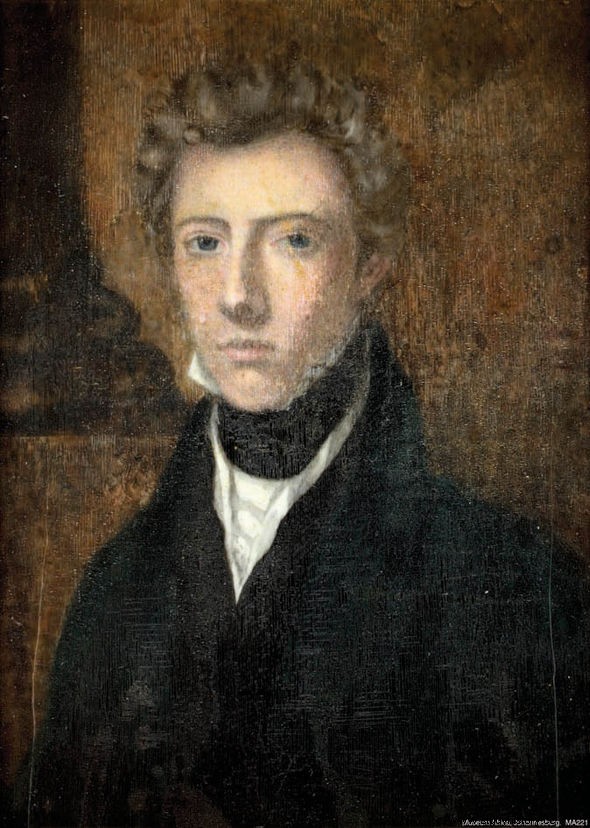This is what his tombstone says:
Dr. James Barry
Inspector General of Hospitals
Died 26 July 1865
At the age of 70
And who was this James Barry?
He was the surgeon who, at the beginning of the 19th century, performed the first caesarean section on record in which the mother and child survived. Although some will still believe that the origin of the term caesarean section is due to Julius Caesar for having been the first to be born by this method, it is not true. It was already known in Rome, but Julius Caesar's mother did not undergo a caesarean section, because it was only used in cases in which the woman in labor had died, and Aurelia, her mother, died when Julius Caesar was 45 years old. . If childbirth itself already posed a risk for the mother, performing a surgical intervention at this time, with the possible and frequent infections, meant almost certain death for the woman. So, our protagonist was the first to carry out this intervention, without his mother having died, and he was successful in getting them both to survive. As a thank you to the successful surgeon, the boy was named after him:James Barry (with a last name and everything, just like a few years ago some children were given their own name Kevin Costner).
With the support of his mother -his father died when he was a child-, the help of David Steuart Erskine, the Earl of Buchan, and money from his uncle, the painter James Barry, he managed to get him accepted into the University. of Medicine in Edinburgh. At the age of twenty-two he obtained his bachelor's degree, but not before the Earl of Buchan had to intervene on several occasions because the academic authorities suspected that he was much younger (his voice and beardless face made him look like a teenager). After passing the Royal College of Surgeons exam, and again having to intervene with the Earl and his uncle's money, he enlisted in the army as an assistant surgeon. And from that moment he began a brilliant career that would take him to India, South Africa, Mauritius, Trinidad and Tobago, Saint Helena, Malta, Corfu, Jamaica and Canada. Brilliant, yes, but conditioned by his strong character and clashes with religious and military authorities. In truth, he was difficult to deal with. However, in the practice of medicine he was one of the most important surgeons of the time. In addition to the aforementioned caesarean section, which he performed in Cape Town (South Africa), and the investigation and treatment of diseases such as syphilis or leprosy, James Barry became a committed activist for health reforms that would improve hospital conditions, prisons and barracks. Meanwhile, he continued to treat rich and poor, settlers and slaves alike. Despite all the problems that his criticism and his reforms caused him, both with local and military authorities, he was appointed Inspector General of Hospitals. But his health began to deteriorate and in 1864 he returned to London, where he would die of dysentery a year later.

What was his last wish?
In July 1865, in London, a woman named Sophia Bishop was entrusted with preparing the body of James Barry, but she did not respect his last wishes, which were not to examine his body, whatever it was, and to bury him in the same clothes in which he died. . So, she undressed James and was met with… A WOMAN'S BODY!!! that, furthermore, from the stretch marks on her abdomen it could be assumed that she had been pregnant. More than 50 years before women were allowed to practice medicine, Margaret Ann Bulkley she, that was her real name, had managed to study at the University of Edinburgh, join the Royal College of Surgeons and enter the British Army.
The fact that the famous surgeon was actually a famous surgeon (all of James's honors and achievements belonged to Margaret) explains some of the details. Logically, so that Margaret could study and practice medicine, she had to count on her stubbornness, the support of her mother, who also helped her masculinize herself, money from her uncle (to finance her studies and from which she took her name) and the necessary complicity of the count. Logically, all her family knew that she was a woman, and each of them had the role of her to make Margaret's dream come true. When the academic authorities doubted her age because of her voice and her beardless face, it was because... because they were the features of a woman, or that dark and difficult character that she had, it was a role she played to keep her distance and, since his physique did not help, seem more "man". Although there was evidence of a possible pregnancy, there is no evidence that she had any children, but she did have an affair. During her time in Cape Town, she appears to have had a furtive affair with the governor of the colony, a widower named Charles Somerset.
The fact is that, after discovering the cake, many joined the "I already knew" bandwagon, but the reality is that the subject was forgotten -as I said at the beginning, the name of James Barry was engraved on his tombstone-, Perhaps because the army was interested in running a thick veil and not being "portrayed", or it was simply considered that their exceptional work for so many years was above their status as a man or a woman. In fact, the doctor who signed the death certificate said…
It's none of my business if Barry was male or female.
Source:Neither stupid nor crazy
